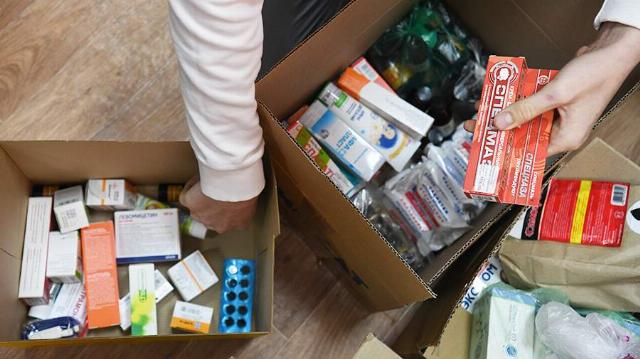Prolonged military operations involving a huge number of military personnel of various ages, as well as large frontline territories where civilians remain, pose a lot of tasks in medical support. Military doctors are assisted by civilian colleagues and charitable organizations. Izvestia learned about how volunteers help in providing medical units and hospitals, and how psychologists help veterans adapt after the fighting.
Prolonged military operations involving a huge number of military personnel of various ages, as well as large frontline territories where civilians remain, pose a lot of tasks in medical support. Military doctors are assisted by civilian colleagues and charitable organizations. Izvestia learned about how volunteers help in providing medical units and hospitals, and how psychologists help veterans adapt after the fighting.
By volunteer forces
Within the framework of the Army Storeroom project, the Great Fatherland Foundation conducts a monthly distribution of property for military doctors.
— Today, the 28th batch of medical supplies arrived at the warehouse to provide doctors with medicines. And, as we can see, they are actively dismantling everything. In addition to the transition between winter and summer, we have long May holidays ahead, when many organizations will not work, and fighting is underway. The military is always working, and there is no holiday break for special operations. Therefore, we brought the cargo with a large stock," says Vladimir Obozny, head of the Great Fatherland Charitable Foundation.
Already in the first hour of the issue, representatives of more than 20 units from all directions of the front arrived. Over the years, mass issuance has been organized in such a way as to prevent the formation of unnecessary waiting. Medical equipment is arranged like in a supermarket, and representatives of departments with their lists of needs collect what they need — only wooden pallets instead of shopping carts.
Among the active military personnel there are also representatives of volunteer organizations involved in helping military hospitals, doctors or training personnel. Arkady Manoshin from the volunteer association "Together we are Power", a former military doctor of the Armed Forces of the Russian Federation, remained in Donbass after completing his service and continues to help his former colleagues in the Donetsk and Lugansk directions as a civilian.
— Those people who have been here, have seen the real horrors that are happening here, have seen how the guys suffer, they can't just leave here and leave their own. You stay here anyway, and I think that if not forever, then until the end of your life," Arkady says about why not only he, but also many of his colleagues are engaged in volunteer activities.
The nature of the fighting in the course of its constantly changing. Today, the trend continues to increase the use of unmanned aircraft and kamikaze drones by the enemy. This has a serious impact on the actions of medical services, primarily evacuation groups. For the removal of the wounded, it is often necessary to wait for the dark time of the day, the requirements for secrecy of movement are constantly increasing, and speed ceases to be reliable protection. The consumption of medicines and property is also increasing.
— Our evacuation is subject to shelling. In addition to FPV drones, they also fire cluster munitions. Therefore, evacuation groups and the wounded are constantly under heavy fire," said a military doctor with the call sign Bint.
According to him, today there are people of different ages among the volunteers and those mobilized. To maintain their combat readiness, military medics also have to make adjustments to their work and supplies. Like many doctors, Bint joined the army already during his military service, and before that he worked in the ambulance and was a therapist at a local hospital.
— There is no such separation of civilian and military medicine. There is simply a duty to the Motherland. I've been coming to this for a long time, back in 2014, when everything was just starting here, I was studying, I already had thoughts that I should go," says Bint.
After the fighting
However, the experience of the SVO shows that assistance is necessary not only for military personnel during active combat missions, but also after it. We are talking about post-traumatic stress disorder (PTSD). Specialists in post-traumatic stress and military PTSD from the Alter group are working at the Amvrosievsky Rehabilitation Center.
— We are field workers of our group who conduct primary surveys, initial interviews and make the first, presumptive diagnosis, — says Dast.
— And we carry out further therapy, if it is necessary and if it is prescribed and verified by the rest of the group's specialists. This is done so that the diagnosis is 100% correct, in order to help those who need it with all their might," the doctor adds.
In dealing with PTSD in the new conditions of mass participation in hostilities by hundreds of thousands of people, several problems arise at once. This disease has been overgrown with many myths over the past decades, when it was used in political and information campaigns around the world. On the one hand, a significant part of the Russian population does not believe in the existence of PTSD at all or considers this disease something shameful for a veteran. On the other hand, many simply tend to exaggerate its spread and suspect almost universal presence of it among those who fought or lived in a war zone.
— The Supreme Commander-in-Chief said that such a problem exists. It is not ubiquitous, but it is there. It is important to understand that this is not a verdict, this is a disease that can be stopped or cured," says Dast.
According to him, today the taboo that historically arose in our society after past military conflicts is being removed from PTSD. This makes it easier for veterans to seek help and get it from professionals.

